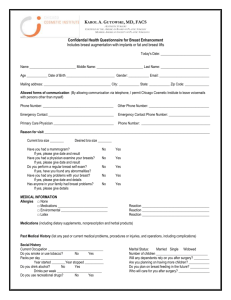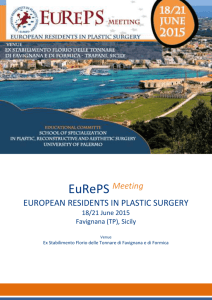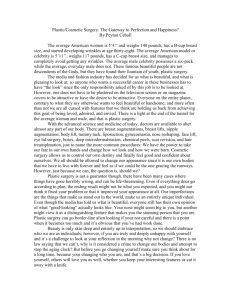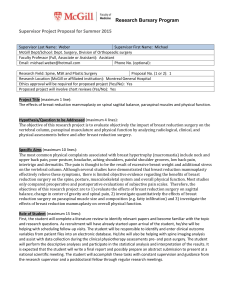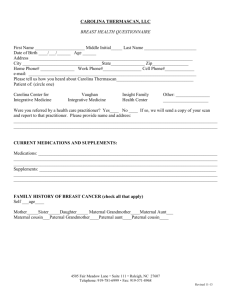The German Society of Plastic Reconstructive and Aesthetic Surgery
advertisement
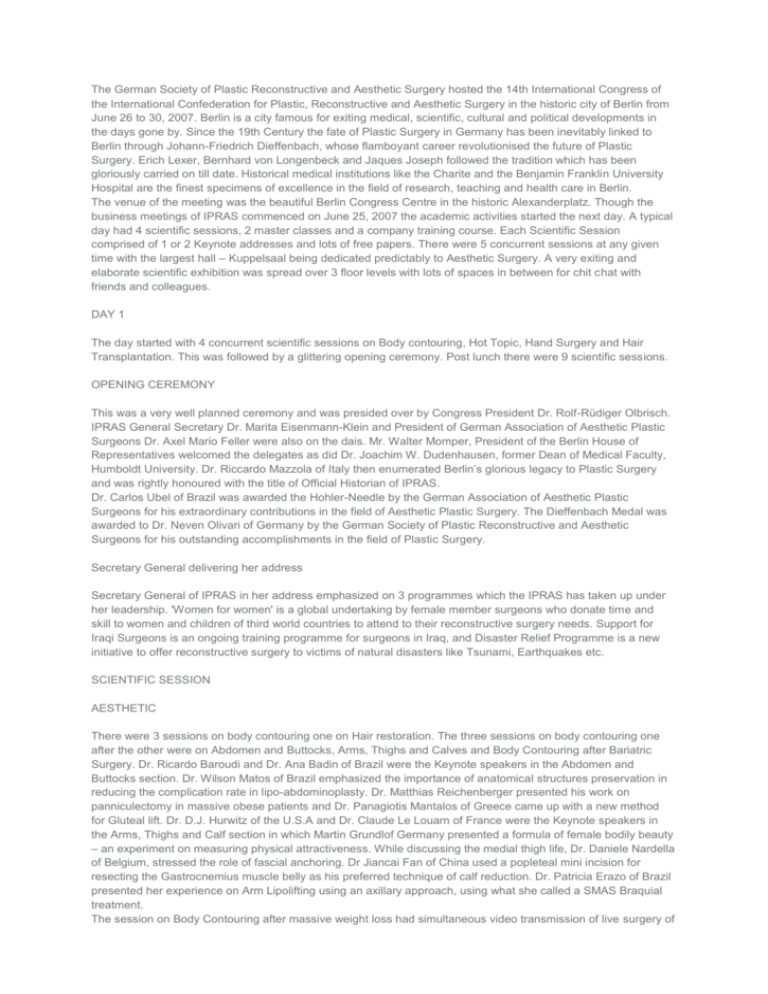
The German Society of Plastic Reconstructive and Aesthetic Surgery hosted the 14th International Congress of the International Confederation for Plastic, Reconstructive and Aesthetic Surgery in the historic city of Berlin from June 26 to 30, 2007. Berlin is a city famous for exiting medical, scientific, cultural and political developments in the days gone by. Since the 19th Century the fate of Plastic Surgery in Germany has been inevitably linked to Berlin through Johann-Friedrich Dieffenbach, whose flamboyant career revolutionised the future of Plastic Surgery. Erich Lexer, Bernhard von Longenbeck and Jaques Joseph followed the tradition which has been gloriously carried on till date. Historical medical institutions like the Charite and the Benjamin Franklin University Hospital are the finest specimens of excellence in the field of research, teaching and health care in Berlin. The venue of the meeting was the beautiful Berlin Congress Centre in the historic Alexanderplatz. Though the business meetings of IPRAS commenced on June 25, 2007 the academic activities started the next day. A typical day had 4 scientific sessions, 2 master classes and a company training course. Each Scientific Session comprised of 1 or 2 Keynote addresses and lots of free papers. There were 5 concurrent sessions at any given time with the largest hall – Kuppelsaal being dedicated predictably to Aesthetic Surgery. A very exiting and elaborate scientific exhibition was spread over 3 floor levels with lots of spaces in between for chit chat with friends and colleagues. DAY 1 The day started with 4 concurrent scientific sessions on Body contouring, Hot Topic, Hand Surgery and Hair Transplantation. This was followed by a glittering opening ceremony. Post lunch there were 9 scientific sessions. OPENING CEREMONY This was a very well planned ceremony and was presided over by Congress President Dr. Rolf-Rüdiger Olbrisch. IPRAS General Secretary Dr. Marita Eisenmann-Klein and President of German Association of Aesthetic Plastic Surgeons Dr. Axel Mario Feller were also on the dais. Mr. Walter Momper, President of the Berlin House of Representatives welcomed the delegates as did Dr. Joachim W. Dudenhausen, former Dean of Medical Faculty, Humboldt University. Dr. Riccardo Mazzola of Italy then enumerated Berlin’s glorious legacy to Plastic Surgery and was rightly honoured with the title of Official Historian of IPRAS. Dr. Carlos Ubel of Brazil was awarded the Hohler-Needle by the German Association of Aesthetic Plastic Surgeons for his extraordinary contributions in the field of Aesthetic Plastic Surgery. The Dieffenbach Medal was awarded to Dr. Neven Olivari of Germany by the German Society of Plastic Reconstructive and Aesthetic Surgeons for his outstanding accomplishments in the field of Plastic Surgery. Secretary General delivering her address Secretary General of IPRAS in her address emphasized on 3 programmes which the IPRAS has taken up under her leadership. 'Women for women' is a global undertaking by female member surgeons who donate time and skill to women and children of third world countries to attend to their reconstructive surgery needs. Support for Iraqi Surgeons is an ongoing training programme for surgeons in Iraq, and Disaster Relief Programme is a new initiative to offer reconstructive surgery to victims of natural disasters like Tsunami, Earthquakes etc. SCIENTIFIC SESSION AESTHETIC There were 3 sessions on body contouring one on Hair restoration. The three sessions on body contouring one after the other were on Abdomen and Buttocks, Arms, Thighs and Calves and Body Contouring after Bariatric Surgery. Dr. Ricardo Baroudi and Dr. Ana Badin of Brazil were the Keynote speakers in the Abdomen and Buttocks section. Dr. Wilson Matos of Brazil emphasized the importance of anatomical structures preservation in reducing the complication rate in lipo-abdominoplasty. Dr. Matthias Reichenberger presented his work on panniculectomy in massive obese patients and Dr. Panagiotis Mantalos of Greece came up with a new method for Gluteal lift. Dr. D.J. Hurwitz of the U.S.A and Dr. Claude Le Louarn of France were the Keynote speakers in the Arms, Thighs and Calf section in which Martin Grundlof Germany presented a formula of female bodily beauty – an experiment on measuring physical attractiveness. While discussing the medial thigh life, Dr. Daniele Nardella of Belgium, stressed the role of fascial anchoring. Dr Jiancai Fan of China used a popleteal mini incision for resecting the Gastrocnemius muscle belly as his preferred technique of calf reduction. Dr. Patricia Erazo of Brazil presented her experience on Arm Lipolifting using an axillary approach, using what she called a SMAS Braquial treatment. The session on Body Contouring after massive weight loss had simultaneous video transmission of live surgery of a Lowe Lockwood procedure being performed by Dr. Dirk Richter of Germany from Martin Luther Krankenhaus, Berlin. Moderated lucidly by Dr. Al Aly of the U.S.A. the steps were most wonderfully demonstrated and appreciated by a large audience. Dr. Manuela Berrocal of Colombia in her own inimitable style showed how to make art in body contouring. Dr. Mostafa Ghahremani of Germany showed the usefulness of Tumescent Local Anaesthesia in large aesthetic procedures of trunk and Dr. Manuel Garcia-Velasco of Mexico enumerated the safety recommendations for Abdominoplasty, when done in isolation or when combined with other procedures. Dr. Thomas Benson of Brazil discussed Massive Localized Lymphoedema (MLL) in Bariatric patients and Dr. Ghenadie Contu of Moldova talked about combined operations in body contouring surgery. The session on Hair Restoration had Rolf Nordstrom of Finland and Carlos Ubel of Brazil as Keynote Speakers. Dr. Ubel discussed the role of Plasma Growth Factors in Male Pattern Baldness Surgery. Dr. Jiping Wang of China showed the Single hair grafting with needle technique for reconstructing eyebrows and Dr. Jincai Fan of China presented a Dense-Packing Sliced Hair Grafting technique for hair restoration. AVOIDANCE OF MALPRACTICE Spread in two sessions this section had some stalwarts like Ivo Pitanguy of Brazil and Robert Goldwyn of the U.S. as Keynote Speakers. Dr. Goldwyn true to his eagerly awaited Editorials in the PRS, reminded the audience to be doctors first and Plastic Surgeons next. How to recognize and subsequently avoid patients unsuitable for aesthetic surgery, and a precious collection of pearls pitfalls and lessons learned from the experience of the likes of Mark Gorney, Bernard Cornette de Saint Cyr and Byrant Toth was the essence of this session. Dr. Simone Preis of Germany discussed the prevalence ob Body Dysmorphic Disorder, Dr. Sujatha Todiparthi of the U.K. analyzed the referrals for psychological assessment prior to Aesthetic Surgery and Mr. Benjamin Brown also from U.K. was of the opinion that skin scar severity was related to psychological disturbances. Aglobal viewpoint was sought in this session to identify the difficult patients, avoid them and thereby avoid the Medical Malpractice plague. HAND SURGERY This session was on soft tissue reconstruction and Dr. Don Lalonde of Canada was the Keynote Speaker. Dr. Jorg Dabernig of he U.K. presented the dorsal homodigital adipofascial flap for volar defects of fingers and Dr. Nicolas Douphin of Luxembourg presented an anatomical study of Dorsal Metacarpal Arteries, showing their potential clinical applications. Dr. Vinay Tiwari of India presented the Prepucial flap as an adjunct to Groin flap in forearm and Hand Injuries and Dr. D. Totir of Romania showed that even after unsuccessful replantations the hand can be made workable. SURGICAL ANATOMY This session had some very interesting papers and had Dr. Hanno Millesi and Dr. Elisabeth Wuringer as Keynote Speakers. Dr Lars-Hinrich Evers of the U.S presented an anatomical study of the free Serratus Fascia flap and showed its clinical applications. Dr. Kazuyuki Masumoto of Japan deliberated on Superior Epigastric Artery Perforator Axis Propeller flap and Dr. Christian Windhofer of Austria showed the anatomical basis of Fasciocutaneous Infragluteal flap. CRANIOFACIAL This first session on Craniofacial had Dr. Mutaz Habal of the U.S. as Keynote Speaker. Dr. Jorge Antonio Guerrissi of Argentina presented his technique of functional and anatomical nasal ala reconstruction in secondary rhinoplasties. Dr. Silvio Podda of the U.S came up with 30 years experience of Post Traumatic / Post Surgical Orbital Deformities. Dr. Gordon Wilkes of Canada enumerated the myths and misconceptions of craniofacial osteointegration and Dr. Alaa Gheita of Egypt showed his intracranial hemiorbital; transposition for correction of hypertelorism. CURRENT CONCEPTS IN MELANOMA Right From correct biopsy techniques to routine use of PET scanning in Metastatic Melanoma, to its management in typical areas like heel and Ear were all discussed in this session. Dr. Theodora Petrakopoulou of Greece and Dr. Merlin Guggenheim of Switzerland discussed the role of Sentinel node biopsy and Dr. Tina Tos of Denmark deliberated on Melanoma of unknown primary site. CLEFTS With Mr. Brian Sommerland of the U.K. as the Keynote Speaker there were some very interesting presentations and discussions in this section. Dr. Hidemi Akai of Japan dwelled on Intra-operative Bone Tissue Engineering in Primary Bone Grafting in Cleft Lip and Alveolus. Dr. Rajeev Ahuja of India presented his “limited Open” approach to Primary Rhinoplasty in his Bilateral Cleft Lip patients. Dr. Yasuyoshi Tosa of Japan presented the Pre-surgical Nasoalveolar Moulding technique in Cleft Grade II bilateral cases and Dr. Kook Hyun Kim of Korea showed how to correct Cleft Lip Nose deformity by Fat Injections. Two more sessions one on War Injuries and one on miscellaneous reconstructive endeavors completed the Day 1 of the Conference. COMPANY TRAINING COURSES There were 2 such courses on Day 1. BAXTER had a course on Tissue Fibrin Sealant – Advancing Flap Surgery, which was chaired by Mr. Peter Hodgkinson of the U.K. Fibrin sealants were used in Breast Reconstruction and Facelifts. An extended onset time of the sealant ensures a uniform distribution of the same before flap adherence occurs. A prospective study of 200 face lifts showed less seroma formation and a retrospective study of 207 breast reconstructions with autologous DIEP and TRAM showed successful stabilization of microsurgical vessel anastomosis using fibrin sealants. The ALLERGAN course was on ‘Optimizing Breast Surgeries with Implants’ and it outlined the rationale of when, how and why to use round or Anatomical implants. The decision making process of selecting implants in Breast Augmentation, Augmentation Mastopexy and Post mastectomy Breast Reconstruction was deliberated upon in great details. DAY 2 MASTER CLASSES Five Master Classes were conducted in the morning and five in the evening. The morning session had Breast Reduction, Rhinoplasty, Denervation procedures on the Carpus, Treating Human Fat and Sagittal Mamma reduction. The evening classes were on Breast Reduction, Advanced Surgical Techniques in Facial Rejuvenation, Ear Reconstruction, Liposuction of Body and Abdomen and Quality and Safety in Aesthetic Plastic Surgery. BREAST There were 4 sessions on Breast – Breast Augmentation, Complications of Breast Augmentations, Breast Ptosis and Asymmetry and Breast Cancer Therapy and Plastic Surgery. Dr. Anadi Begic of Norway presented a Standardized Method of Evaluation of Cosmetic Results after Breast Surgery and Dr. Umar Daroz Khan of the U.K. deliberated on a Muscle Splitting Breast Augmentation, suggesting a new technique in a totally different plane. Evaluating the different surgical routes of Breast Augmentation Dr Md. Zaki of Egypt opted for endoscopic breast augmentation and Dr. Jozef Fedeles of Slovakia cautioned about the pitfalls of Augmentation surgery. Dr. Andreas Arens of Germany spoke about the complications other than capsular contracture and Dr. Amanda Isaac of the U.K wondered whether Plastic was always Fantastic. In the Breast Cancer therapy section Dr. Lisbet R. Holmich of Denmark suggested that breast reconstruction with implants after ablating invasive breast cancer does not impair prognosis. Dr. Flavio Nogueira of Brazil presented technique of Minimal Invasive Mastectomy and Dr. Hakan Bronson of Sweden presented a 12 year post-operative study in which he showed that Liposuction completely reduced post-mastectomy arm lymphoedema. Dr. Egle Muti of Italy presented his Keynote lecture on Breast Ptosis an Asymmetry and Dr. Laszlo Kovacs of Germany enumerated the existing techniques and suggested newer alternatives for the evaluation of Breast Asymmetry. RHINOPLASTY Presenting a Keynote Lecture Mr. Dai Davies of the U.K. showed how Nose has evolved in various climatic conditions and people with different level of exercise tolerance have different noses. He went on to show 5 variety f Lateral Crus and 3 types of Medial Crus and wondered how one stereotype Rhinoplasty could address all noses? Dr. Wolfgang Muhlbauer of Germany cautioned to respect the Nasal SMAS and showed how result changed and deteriorated with age. He had long follow up of 20 years and also showed the results of a Rhinoplasty performed by Joseph 72 years ago! Dr. Ghassan Zabaneh of Canada presented a ‘Hands on Training Module’ of Rhinoplasty and Dr. Eckart Buttler of Germany deliberated upon the Osteotomies in Rhinoplasty. Dr. Rainer Rupprecht of Germany presented 100 consecutive cases of Extracorporal Septoplasty and Dr. Jin Wong Kim of Korea presented his experience of treating the Asian nose in 500 cases performed in the last 10 years. RECONSTRUCTION OF LOWER EXTREMETIES Dr. Fu-Chan Wi of Taiwan was the Keynote speaker and spread in 3 sessions this was a well attended segment. Dr. Sabine Gruber of Austria presented a clinico-anatomical study of Distal Soleus Adiposal Pull-through flap and shoed its versatility in covering exposed Achilles tendon. Dr. Ali Reza Ercocen of Turkey presented his experience of free ALT perforator flap with vascularized Fascia Lata in areas of major tendon reconstruction with overlying skin defects. Dr. Christian Laback of Austria preferred the distally based Medial Hemi-Soleus flap for osteomylitis in distal leg and Dr. Christoph Heitmann of Germany showed the use of massive bone allografts with intramedullary free Fibula flap for achieving limb salvage. Offering a helpful solution in difficult vascular situations, Dr. Michael Naik of Germany showed the versatility of an Arteriovenous loop. Dr. Robert Hiemer of Belgium presented his experiences of major lower limb replantations and Dr. Martin Houg of Switzerland preferred the free senate Lateral Arm flap for distal leg and ankle defects. Dr. Constante Saliba Valler of Brazil presented Heel Reconstruction using Vastus Latralis muscle associated with thinned innervated skin island. SURGICAL ANATOMY A computer aided planning method for micro vascular bone reconstruction was presented by Dr. Gerhard Pierer of Switzerland. Dr. Horacio Zenha of Portugal talked about Free Flap designing using 3D Biomodelling technique and Dr. Manfred Schmidt of Austria deliberated upon the Anatomical Basis of Internal Mammary Artery perforator flap in a cadaver study. HAND SURGERY Mr. Duncan McGrouther of U.K. was the Keynote speaker in this session. Carpel tunnel Syndrome was discussed in great details with Dr. Martin R. Le Blanc of Canada presenting a cost and efficiency analysis of treating them in the main operating theatre versus an ambulatory setting. Dr. George M. Huemer of Austria did not eel that post operative splinting after carpel tunnel release improved functional and neurological outcome. Vascularized Joint transfer for finger joint reconstruction was offered by Dr. Robert Hierner, with a detailed deliberation on its indications and long term results. RESEARCH A very interesting paper on ‘Signal Transduction when performing End to Side Neural Coaptation’ was presented by Dr. Peter Vancso of Hungary. Dr. Rytis Rimdeika of Lithuania presented the ‘Wound Monitor’ project, a semiconductor based Electronic nose that can identify wound pathogens. Dr. Nikolaos A. Papadopulos deliberated on intrauterine repair of surgically created cleft lip in pregnant sheep model and Dr. Henry Vasconez of the U.S.A talked about effects of Extracorporeal Shock Wave therapy on wound healing in rat models. In the session on Research in Microsurgery Michael Findlay of Australia presented the unique “Ready to wear” and “Off the Shelf” Flaps from the Bernard O’Brien Institute of Microsurgery. He discussed the in-vivo and in-vitro approaches to tissue flap production in Microsurgery. Dr. Olga Shimbireva of Russia discussed the prefabrication of a Microsurgical Osteocutaneous Flap in rat model. Sutureless laser anastomosis in Micro-vessels was presented by Mihai A. Constantinescu of Switzerland, and effects of Stem Cells on various Skin Flap models – random flaps, prefabricated flaps, expanded flaps etc. were discussed by Dr. Cogri Uysal of Japan. TUMOR SURGERY This was a session in which reconstruction in mesodermal tumours was considered. Mr. Jonathan Adamthwaite of Leeds Sarcoma Service, U.K. presented their experience as did Dr. Benjamin Meilik from Royal Sich Children Hospital in Canada. Similar experiences in paediatric patients were shared by Dr. Birgit Karle of Austria. A few interesting case reports on giant 77Kg Neurofibroma and Infantile Systemic Hyalinosis were also presented. RECONSTRUCTION OF UPPER EXTREMETIES With Günter Germann of Germany and Zun-Li Shen of China as Keynote speakers the papers were on varied topics – hydradenitis suppurativa, meningococcal septicaemia, complex upper limb reconstructions and results of micro-transplantations. Dr. Sammy Al-Benna of the U.K. presented the U.K. presented their unit’s experience of free Ulnar Forearm Flap and Marek Molski of Poland deliberated on the use of vascularised bone grafts in complex defects. COMPANY TRAINING COURSES There were 2 courses on Day 2. MENTOR introduced ‘Body Logic’, a new method for breast surgery decision making to improve patient outcomes through implant choices and surgical decision making. The Body Logic System did not dictate a specific implant but provided guidance for selecting a range of devices that would increase the likelihood of patient satisfaction. Chaired by Prof. Jutta Liebau of Germany the STORZ course was on ’Meet the Experts in Endoscopic Plastic Surgery’. Experts from Europe dwelt on possibilities and advantages of Endoscopic Surgery, tips and tricks in Forehead Lift and Axillary Approach for Endoscopic Breast Augmentation. Endoscopic techniques in Hand Surgery too were discussed. DAY 3 MASTER CLASSES There were 6 master classes in the morning and 5 in the evening. The morning classes were on Autogenous Breast Reconstruction, Tetraplegic Hand, Rhinoplasty, Facial Skeleton, Face & Neck lift and Fat Grafting. The evening classes were on From Lipofilling to Body-Lift, Aesthetic Breast, Aesthetic Periorbital Surgery, Minimal Invasive Facelift and Fat Sculpturing BREAST REDUCTION Breast Reduction was spread in 2 sessions and Dr. Manuel Garcia-Velasco of Mexico and Dr. Claude Lassus of France were the Keynote speakers. Dr. Norbert Heine presented the 10 year post operative results with vertical scar reduction mammoplasty. Mapping the vascular territories of anterior cheat wall with topography of the vessels and their importance in Breast Reduction procedures was highlighted by Dr. Don Mon O’Dey of Germany. Dr. Sanjay Azad of the U.K. presented a prospective study of 100 cases of inferior pedicle vertical scar technique and Dr. Flavio Nogueira of Brazil preferred resection of a trapezoid base prism for his vertical scar reduction mammoplasties and thin superomedial pedicle for severe mammary hypertrophy. The Hall-Findlay Superomedial pedicle vertical mammoplasty was discussed in great details by Dr. Furat Yuksel of Turkey. Dr. Alaa Gheita of Egypt and Dr. Jan J van Wingerden of Netherlands cautioned about the complications of Reduction Mammoplasty. FACIAL REANIMATON Dr. Manfred Frey of Austria and Dr. Ronal Zuker of Canada were the Keynote speakers and the latter’s Unit presented a lucid paper on Etiology and Treatment of Facial Paralysis in Children. Dr. Ali Majallal of France talked about Adipocytes Graft in volumetric restoration of dysmorphic face and Dr. Folvio Urso-Baiarda of the U.K. compared one and two stage surgeries for facial reanimation. UROGENITAL SURGERY Three papers in this session were from India. Dr. R.B. Ahuja talked about Deepithelialized turnover Dartos flap for repair of Urethral Fistula, Dr. V.K. Tiwari presented a technique of Functional Hypospadias repair and Dr. S. Bhattacharya deliberated upon Reconstructing Perineal defects after Ablative Cancer Surgeries. Dr. Jiang Hua of China presented a 25 year experience of 182 penile reconstructions and DR. Gustavo Sturtz of Germany shared his ten years experience with Latissimus Dorsi Neurovascular transfer for treatment of Bladder Acontractility. SECONDARY RHINOPLASTY Management of Post Rhinoplaasty deformities was discussed most lucidly by Dr. Gaith Shubailat of Jordan and Mr. Michael Baldwin of Australia presented his split septal graft technique for nasal tip reconstruction. Dr. Hamid Karimi of Iran treated secondary nasal obstructions with what he called ‘a butterfly graft’ and Dr. Helmut Fischer of Germany emphasized the importance of Nasal Lining in nasal reconstruction. AESTHETIC ANCILLARY PROCEDURES Thermage, Percutaneous Collagen Induction therapy (PCI) and subcutaneous application of Collagen Matrix in the aging midface were the topics discussed in this session. Dr. Matangi Ramakrishnan of India analysed Keloids and Hypertrophic Scars and stressed on utility of Brachytherapy in Post traumatic Ear lobe Keloids. CRANIOFACIAL This session was dedicated to microsurgical reconstructions in Head & Neck region. Dr. Horacio Costa of Portugal presented the Flow-Through Sequentially Linked Free Flaps, Dr. D. Antonopoulos talked about Perforator Free Flaps and Dr. Luis Azevedo preferred the Dorsalis Pedes free flap, particularly for oro-mandibular reconstructions. The problem of Radiation induced Crico-pharyngeal stricture was addressed by Dr. S. Mohankumar of India using the island PMMC flap. RESEARCH – TISSUE ENGINEERING Dr. Andreas Arkudas of Germany presented an evaluation of Blood Vessel ingrowth in Fibrin Gels and evaluated the role of Growth Factors in their subcutaneous implantation model. Dr. Zun-Li Shen Of China showed that Ciliary Neurotrophic Factor-Coated Polyglycolic Polylactic Acid Nerve conduits could be used to repair 2.5 cm long canine Tibial nerve defects. Dr. Ruben Yap Kannan of the U.K. talked about in-vivo testing of Nano-Engineered Microvascular grafts and Dr. Jeremy Wilson of Australia presented a novel strategy for Adipose Tissue Engineering with Human Stromal Vascular Spheroids. An interesting clinical study in this session was presented by Dr. Sachio Kouraba of Japan in which Autologous Fresh Bone Marrow-Impregnated Collagen Matrix was used to regenerate the wound bed in non-healing leg ulcers. A session on hand injuries stressing predominantly on Ring Avulsion injuries and other degloving injuries, a session on nose reconstruction using various pedicled flaps, free flaps and composite grafts and a session on Suspension techniques in Facial Rejuvenation completed the day. COMPANY TRAINING COURSES There were 2 such courses on Day 3. The ETHICON course was on ‘Preventing and Managing Complications in Body Contouring Procedures for post Massive Weight Loss Patients and the MERZ course had two sessions – one on Efficacy and Tolerability of the Hyaluronic Filler IMD (Belotero) in Nasolabial folds and one on Comparison of the diffusion characteristics of two different neurotoxins in patients with Dynamic Forehead Lines. DAY 4 MASTER CLASSES There were 5 master classes in the morning and 5 in the evening. The morning classes were on Aesthetic Breast, Flaps in Congenital disorders, Abdominal Plastics, Facial Sculpturing and the Vertical Midline Lift. The evening classes were on Body Contouring after massive weight loss, Aesthetic Breast, Periorbital Rejuvenation, Brachioplasty and From Buttocks to Breast – microsurgical Beast Reconstruction. BREAST RECONSTRUCTION Spread in 3 sessions this topic was discussed threadbare. Keynote speakers Dr. Pietro Berrino and Fabio Santanelli (Italy), Dr. Jean Yves Petit (France), Dr. Carl Hartrampf and Bob Allen (U.S.A) made these sessions very exiting and very well attended. Mr. Michael Findlay of Australia presented the work on long term adipose tissue engineering and showed how in the Bernard O’Brien Institute in Melbourne they are proceeding towards making a stable tissue engineered breast. Dr. Nicolas Guay of Canada presented 130 consecutive autologous tissue single stage breast reconstructions after ablative cancer surgery. Dr. Nicola Scuderi of Italy presented a multicentric study of the outcome of Breast Reconstruction using Anatomc Becker Implants in 204 cases and Dr. Flavio Nogueira of Brazil dwelled on the complications of immediate breast reconstruction using Silicone implants. Dr. Christoph Popp of Austria used the Free Fasciocutaneous Infragluteal Flap and Dr. Thomas Delaporte of France opted for the Lipomodelling technique to reconstruct the Breast Volume. A very analytical paper on Analysis of Patient Satisfaction and Donor Side Morbidity after different types of Breast Reconstructions was offered by Dr. Heike Ch. Benditte-Klepetko of Austria. Dr. Akiko Eto while using the Free TRAM flap for Breast Reconstruction used the In-flap vascular augmentation technique and Dr. Rieka Taghizadeh of the U.K cautioned about the risks of TRAM and DIEP flaps in obese women. Dr. Simone Hellmann of the Düsseldorf Breast Cancer Centre presented the experience of more than 200 breast reconstructions using Free DIEP or Fascia Sparing TRAM flaps and Dr. Thomas Benson of Brazil used the internal mammary perforator branches as the recipient for the free flaps in Breast Reconstruction. PERIORBITAL SURGERY An interesting session in which Dr. Lukas Prantl of Germany presented his results of two experiments on perceived attractiveness concerning Eyebrow shape and Eye axis and opined on how an ideal eyebrow and eye should look. Further refinements in rejuvenation of upper eyelid region and of infraorbital region were suggested by Dr. Morten Kveim of Norway and Dr. Andreas Arens of Germany respectively. Dr. Dir F. Richter of Germany presented his 20 years of experience of treating upper and lower eyelid retraction and Dr. Michael Yaremchuk of the U.S talked about Reversing Brow Lifts. BREAST MALFORMATION An interesting session, in which Poland’s Syndrome and Gynaecomastia were discussed in great details, had Dr. Tom Biggs of the U.S. and Dr. Moustapha Handi of Belgium as Keynote speakers. Dr. Vimla Rajan’s paper on Peri-areolar Mammoplasty in Gynaecomastia and Dr. Nimrod Friedman’s (Israel) account of Surgical Management of Tuberous Breast were revealing. BURNS Spread in 3 sessions the papers were both on bur trauma and Burn research. The use of Cellulose dressing (Veloderm), Matriderm, Integra, Sprayed Cultured Epithelial Autografts and Low Energy ERCHONIA Laser in the use of Burn management was discussed by several presenters. The efficacy of Recombinant Human Activated Protein C (Xigris) in assisting healing was discussed by Dr. Thomais Iconomou of Greece and an excellent review of the role 27 Burn Units in Canada have played in delivering Burn Care in the last 21 years was offered by Dr. Charles Snelling. Burns caused by Ionizing Radiations, Plaster of Paris Splints, Ring Burns were all discussed. Dr. Richard Nnnabuko of Nigeria offered a classification of Post Burn Microstomia and Dr. Bishara S. Atiyeh of Lebanon deliberated upon an experimental study on Pharmacological Modulation of Wound Healing. Prof. Matangi Ramakrishnan of India was the Keynote speaker in one of these sessions. HEAD & NECK RECONSTRUCTION In 2 sessions a wide variety of reconstructive efforts were discussed. Mr. David Soutar of the U.K delivered a very thought provoking Keynote address. Dr. Yukiko Nishi of Japan treated severe enophthalmos with sliced costal cartilage chip grafts and Dr. Dimitra Tsiliboti of Greece free ALT with Porous Polyethylene implants to treat large composite defects. Rei Ogowa of Japan used super-thin parascapular flaps for treating neck contractures and Jorge Guerrissi of Argentina and Dr. Olga Shimbireva of Russia offered a functional reconstruction of trachea using prefabricated chondro-muscular flap and chondro-cutaneous forearm flap respectively. Dr. S. Bhattacharya of India presented his experience of Reconstruction of Hypopharynx and Cervical Oesophagus. Dr. Hiroyuki Sakurai of Japan went a step further and presented long term results of Speech Rehabilitation in these patients, stressing particularly on phonation after free Jejunal grafts. Dr. Horst Schuster of Germany deliberated upon a Reverse Perfused Temporal Flap – an adipocutaneous flap for reconstructions in upper face and Dr. Jincai Fan used a Silicone Suture technique to achieve what he called Non-expander Tissue Expansion. CHEST & ABDOMINAL WALL RECONSTRUCTION An interesting session in which Dr. Christoph Papp of Austria presented the Keynote speech, this session had papers on large incisional hernias, complex abdominal wall reconstructions and various types of sternal and chest wall effects. Dr. Maria Elsa of Paraguay used used Latissimus Dorsi, Mesh and Methyl-metacrylate for a one stage reconstruction of a large chest 3wall defect left after ablating an Askin Tumour and Dr. Tetsuji Uemura of Japan used the Internal Mammary Artery Perforator Axis Propeller Flap for his chest wall reconstructions. Dr. Onno Frerichs of Germany stressed the utility of Vacuum Assisted Closure therapy in infected sternal defects and Dr. Thomas Deloporte of France corrected Pectus Excavatum by Lipo-modelling. PRESSURE SORES Dr. Louis Vasconez of the U.S. chaired this session and was the Keynote Speaker. Clinical application of various flaps in multiple sores was discussed by Dr. Jin Wong Kim of Korea. Dr. Moris Topaz of Israel talked about the role of Negetive Pressure Assisted Wound Therapy (NPT) and Argentina Vidrascu of Romania stressed the role of Pulsed Galvanic Stimulation (PGS) in treating Pressure Sores. The use of Infragluteal and Gluteal Perforator flaps in treating Ischeal and Sacral sores was highlighted by Dr. Oliver Scheufler of Switzerland. COMPANY TRAINING COURSES There were 2 such courses on Day 4. ULTRASHAPE had a course on Non Invasive Body Contouring by Focoused Ultrasound. The idea and the fundamental science of lipolysis by external focoused ultrasound waves was discussed and experts practicing it showed their results. The SKIN HEALTH CARE course was on Matriderm, a pure Collagen-Elastin matrix which was shown to enhance dermal regeneration in burns and chronic soft tissue wounds. DAY 5 MASTER CLASSES There were 5 master classes on the last day of the Conference. Aesthetic Breast, Aesthetic Face in Males, Facial Aesthetic Surgery for the Oriental, Periorbital Surgery and A Template for Panfacial Rejuvenation were the topics discussed. THE FUTURE OF PLASTIC SURGERY The smart Organizers had saved the best for last. Moderated by the IPRAS Secretary General Dr. Marita Eisenmann-Klein herself and addressed by visionaries like Dr. Roxanne Guy and Dr. Bryan Mendelson of Australia, Dr. Daniel Marchac of France, Dr. Kirill Pshenisnov of the Russian Federation and R. Barrett Noone and Dr. Rod Rohrich of the U.S this Panel Discussion really showed where we the Plastic Surgeons and our Speciality are heading. The Secretary General offered the IPRAS vision and Dr. Daniel Marchac and Dr. Bryan Mendelson painted a future for Plastic Surgery and Cosmetic Surgery respectively. Dr. R. Barrett Noone presented his view of what direction education and certification programme of Plastic Surgery should take and Dr. Kirill Pshenisnov drew National and International parallels in the past, present and future of our speciality. Dr. Rod Rohrich wondered if in future there will be a Cosmetic vs. Reconstructive polarization, but all speakers stressed on good education, good training, good knowledge and above all good morals and integrity. To be a good Aesthetic Surgeon one has to be a good Reconstructive surgeon is what came out of these deliberations. AESTHETIC FACE Face and Neck lifts were discussed in this session. Dr. Hermann Lampe of Germany talked about the CreviceMental Deep Plane Facelift for elders and Dr. Sallies Vicariates of Lithuania deliberated upon Endoscope approach to the Mid-face. Dr. Jurgen Holle of Austria showed Facelifts with extensive SMAS dissection, limited skin undermining and short retro-auricular scar and Dr. Manuel Chacon-Quiros of Costa Rica discussed the utility of Harmonic Scalpel in this surgery. GENDER DISORDERS Chaired by Md. Khalaf of Kuwait and Dr. Chanjiv Singh of India, this session had Dr. R.T. Adamian of Russia and Dr. Stan Monstrey of Belgium as Keynote Speakers. Neovaginoplasty was discussed by Dr. Konstantin Lipski of Russian Federation and Seok-Kwun Kim of Korea. Transsexual gender reassignment was deliberated upon by Michael Krueger of Germany and Vasily Hrapach of Ukraine and their quality of life after surgery was discussed in a prospective study by Dr. Dirk J. Schaefer of Switzerland. ALLO-TRANSPLANTS IN RECONSTRUCTIVE PLASTIC SURGERY Four stalwarts in the field of Allo-transplantation were the 4 Keynote Speakers in this session. Dr. Heribert Hussl of Austria dwelt on their experience of Hand Allo-transplantation in Innsbruck. Dr. Hildegunde Piza-Katzer also from Austria opined on the indications and ethics of Allo-Transplantation. Dr. Maria Siemionow of the U.S. talked about the technical aspects of Face Transplantation and also the ethics behind this surgery and Dr. Sylvie Testelin, who’s first Face Transplantation was featured in this Newsletter 18 months back, discussed the surgical aspects of her surgery and also presented her 18 months post operative results. EAR SURGERY With Dr. Sotoru Nagata of Japan and Dr. Francoise Firmin of France as Keynote Speakers this was a lively session. The art and the principles of reconstructing the external ear by tissue expansion was very lucidly presented by Dr. Ai Yufeng of China. Dr. Henning Frenzel of Germany discussed the Implementation of Active Middle Ear Implant (Vibrant Soundbridge) in Total Auricular Reconstruction and Dr. Ibby Younis of the U.K compared the use of tissue expansion vs. Temporo-parietal flap in Autologous Ear Reconstructions. Dr. Joe-Ho Jeong of Korea presented his 12 years experience of using a method of expanding Microtic Auricles and Dr. Sherilyn Keng Lin Tay of the U.K presented a modification of the Antia Flap for Reconstruction of the Ear Small sessions on Blepharoplasty and Innovations in Aesthetic surgery completed the proceedings.

